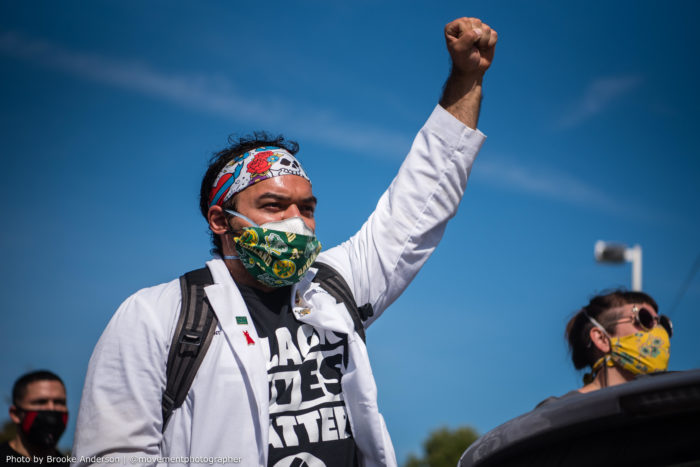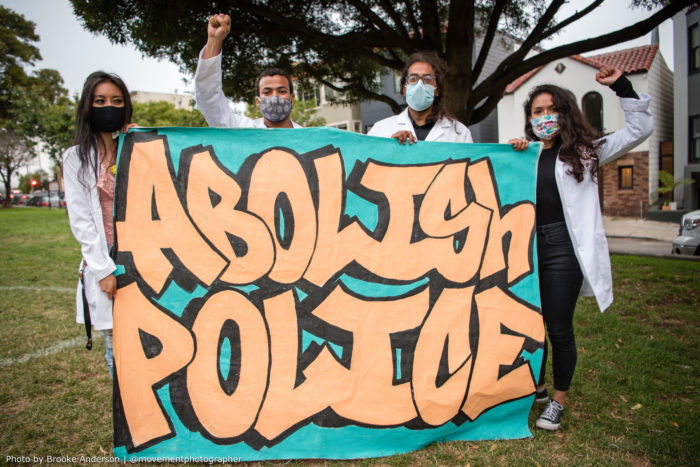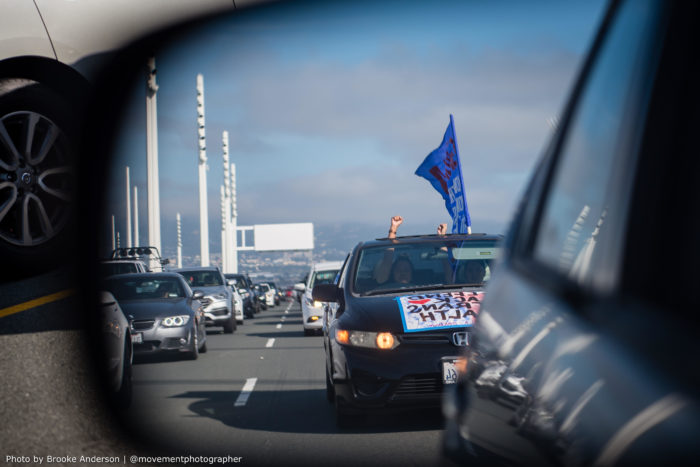

All photos accompanying this article are from a healthcare workers rally in the SF Bay Area organized by a broad coalition including Black Rose / Rosa Negra healthcare workers. Photos by Brooke Anderson, IG: movementphotographer
The racist police murder of George Floyd has lit a fire in the tinderbox of pandemic-era America. We need to carry that energy and rage into every corner of the country and that includes our workplaces, where we spend a huge fraction of our life. Organizing with your coworkers against racism and the police can help deepen this moment of rage into a lasting and sustained multi-sectoral movement that can develop political consciousness among workers, win reforms that weaken the power of police and systemic racism, strengthen the bonds between co-workers, and prepare the ground for striking harder during the next insurrectionary moment.
The examples we’ve already seen of workers taking brave actions in support of the uprising against anti-Black racism sparked by the murder of George Floyd are staggering. Public transit workers in multiple cities have refused to transport police officers and detained protesters. Dockworkers shut down west coast ports for a day. Food service workers have walked out and refused to serve police officers.
The period of mass protests will end, either through exhaustion, cooptation, or repression, and we need to keep an eye on how to act in the next phase of struggle. But for now what’s important is to keep up the pressure with disruptive action and to resist calls to let non-profits and politicians take the lead. Given this, we want to highlight efforts that workers can push for in the coming months to keep the movement growing after the smoke from the burning cop cars fades away.
Build Roots: No Shortcuts in Organizing
The foundation of all workplace action is relationships. The relationships and trust that you build with your coworkers are what everything else flows from, so it is important to always return to the one-on-one conversations. Talking with and understanding your co-workers’ experiences with racism and the police and to have them understand your own. In moments of mass mobilization like this, it can be tempting to leap into action before building those relationships and before creating a workplace committee that can share responsibility and keep each other accountable.

Remember that while you might get a lot of attention and maybe win some short term gains by doing something like making a call on your own for a workplace walkout against racism in the company, the real impact of workplace action is in how it builds the power, self-organization, leadership, and militancy among your co-workers in the longer term. Bosses can easily regain the hand after a short-term flare up in protest by making symbolic concessions while targeting the core organizers for repression. But bosses are much less prepared to defeat a sustained campaign of insurgency with deep roots and broad leadership. That is why you should never take shortcuts and skip over building relationships and collective leadership through one-on-ones.
Not Just the Usual Suspects
Union workers should understand that anti-racism isn’t just solidarity activism. It is not about connecting with other like-minded union activists to go carry the union banner in the street together. Anti-racism is a fundamental union issue; in fact, one of the most critical union issues in the history of this country.
Unless workers bring anti-racist organizing into their workplaces and transform their unions into vehicles for attacking the structures of white supremacy, then their unions are dead ends for systemic change in this country. So we need to remember that although we might be able to organize an action faster, or we might be able to use more radical demands, by only working with the people who already agree with us, if we’re only politically engaging the same people over and over again, then we’re not making transformation happen in our unions. We need to always be reaching the non-activists who work alongside us, and organizing our previously passive coworkers into anti-racists.
Cops Out of Everywhere
Education workers across the country are already charging into one key fight against the power of the police: kicking cops off campus and out of school districts. A number of schools have been successful in pushing school districts to cancel contracts with police. Education workers everywhere else should discuss bringing this up as a demand together with students. The follow up challenge will be the fight against replacing police on campus with private security under the control of racist school administrations. Education workers can look to black student groups to work together on creating proposals for alternatives that are anti-racist and democratically controlled, like student-run safety patrols.
Other public service workers can also agitate to get police removed from their workplaces. Hospital workers have long had to deal with issues like aggressive police officers coming into the emergency room with patients and causing trouble. Now, building off of the campaigns to keep ICE out of our workplaces, there is an opening to organize with your co-workers to get police banned from our hospitals, libraries, recreation facilities, etc.
The Austerity Battle – Care or Cops?
The global pandemic, combined with the generally hellish nature of our country’s economic system and government, has sparked a deep depression. This means that massive budget cuts are already on the table in every city and state. Every public sector worker needs to make the connection – the money to keep paying for your job can be found in the police budget.

Cities spend unbelievably massive amounts of money on bloated police budgets. We need to work on cutting those budgets down to $0, and redistributing it to public services that actually make our communities stronger and healthier. When agitating against cuts to education spending, teachers need to demand more teachers, less cops. Healthcare workers need to demand more nurses, less cops. Bus drivers need to demand more drivers, less cops. Public sector workers should connect with local rank and file public sector workers in other industries to create grassroots coalitions against the budget cuts that demand massive reductions in the police budget to pay for increases in needed social services, and to develop new programs to replace some of the functions that the police currently mis-perform.
The Economics of White Supremacy on the Job
Most workplaces are highly stratified by race and gender. Lower-paying jobs tend to be occupied by women, people of color and immigrants, while higher paying jobs tend to be occupied by men, white people, and non-immigrants. A lot of times this gendered and racialized segregation is accepted as just being the way things are, without further questioning.
Talk with your co-workers about why it is that your supervisors are white, and what impact that has on your workplace environment. Talk about how your co-worker has been denied advancement, while lighter skinned people without experience are brought in for those higher positions. Talk about how there isn’t enough support from the company for employees to go back to school and advance their career, while white people are spending years in school preparing for high-paying jobs without having to work their way through school because their parents are paying tuition.
You can help form an anti-racism action committee in your workplace led by black workers that can take on these systemic issues, as well as addressing more immediate issues like racist harassment through direct action.
Bridges From the Workplace to the Community
This is also an opportunity to build coalitions between the neighborhood and workplace. Organized workers can collaborate with black-led neighborhood organizations to create specific plans for worker- and neighbrohood-controlled public service interventions to be funded with re-directed portions of the police budget.
This could be projects like community mental health and wellbeing clinics, emergency mediation and de-escalation teams, community housing for domestic abuse survivors, whatever the neighborhood needs that workers can provide. These neighborhood demands can be fought for by workers in contract and budget fights. However, before doing coalition work outside of the workplace, workers need to have done the hard work of building up worker committees and infusing them with anti-racist politics, so that there is a real base of power that can win community demands.
Our Power Against the Omni-Crisis
These are some very brief suggestions. There are many more important opportunities for workplace organizing in this moment. Looking ahead, nobody knows where things will go. We are not just in the middle of one crisis – we are in a moment of “omni-crisis” where multiple crises are overlapping while still others lurk in the future as looming possibilities.
We need to be agile in order to adapt to the changing times, and be aware that a small amount of initiative taken in the right place in a moment as unbalanced as this can end up having huge effects.
The most important thing is to continue facing outwards and engaging with the people who spend their days side-by-side with you, sharing struggles and experiences. We know that the non-profits, AFL-CIO leaders and Democratic politicians have little to offer beyond empty plots in their Ford Foundation-funded graveyard of protest movements. If we want to challenge their power, then we need to build an alternative independent workers movement from the bottom up, starting with our relationships on the shop floor.
Evan Milner is a Los Angeles based healthcare worker and a member of Black Rose / Rosa Negra.
If you enjoyed this piece we recommend additional content on healthcare worker organizing “In the Fight of Our Lives: Healthcare Workers Speak Out” and “Healthcare Workers: Back-To-Work Strikes Can Put Health Before Profit.”





Comments